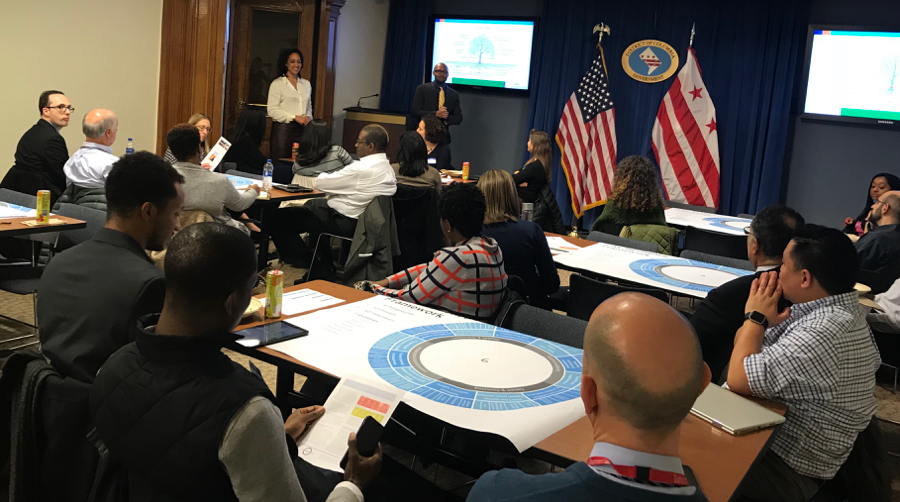This article was written by Sarah Baldauf, senior director of communications, outreach and engagement at the Sumner M. Redstone Global Center for Prevention and Wellness.
Earlier this month, the Redstone Global Center for Prevention and Wellness and Building Community Resilience (BCR) partnered with the Executive Office of the Mayor to convene nearly 40 individuals on the front lines of health and public health to discuss adversity and barriers to health and wellbeing of District residents. DC has extraordinary disparities in longevity, income and economic prosperity. Those living in wards 5, 7, and 8 – and in pockets of other wards – carry the greatest burden of chronic disease, housing instability, exposure to violence, lower incomes, lower educational attainment, and other social determinants of health.
The city’s end goal is big: to develop a DC resilience strategy that will guide the next series of District-wide initiatives and investments to improve the city’s response to acute shocks and chronic adversities, from severe weather events to entrenched inequities related to income, geography and race.
Through a deepening relationship with the District’s Resilient DC office, the Redstone and BCR team led small groups – of doctors, nurses, mental health providers, community organizers, representatives from local hospitals and insurers – through a visioning exercise to identify specific adversities, as well as strengths and opportunities.
We heard a range of challenges that negatively impact health and wellbeing, including mass incarceration, violence and lack of access – to mental health and substance abuse services, stable and affordable housing, quality education, economic opportunities, and to labor and delivery care with the closing of these services at United Medical Center and Providence Hospital. And we heard about potential solutions, including more robust investment in prevention – from out-of-school programming for youth and in-school mental health services to education and connection with resources through paid peer outreach and mentoring programs.
The BCR team has done similar work with its partner, the City of Dallas, to develop a health and health equity resilience strategy (see Dallas Tackles its Public Health Challenges). Both Dallas and DC are among the Rockefeller Foundation’s 100 Resilient Cities – a global network developing actionable resilience strategies to enable cities to ‘bounce back’ in the face of massive social, environmental and economic change. Through partnership with BCR, these two 100 RC cities are broadening the lens of their resilience work to include the essential elements of equitable citywide access to the supports, services and conditions that underpin health and wellbeing. As Wendy Ellis, BCR Project Director and Co-Principal Investigator, describes, doing so will enable communities to not only ‘bounce back,’ but to thrive. It is learning from, being guided by, and partnering with local health and public health experts as we did earlier this week that will enable this work to succeed.


